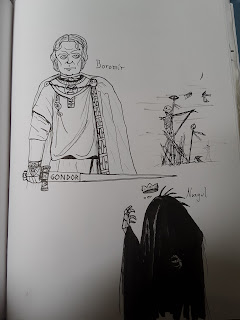The Problem With Disraeli's Angles:The Platypus Reads Part LXXVIII
Mike Mignola's occult-saturated world makes no bones about the existence of spiritual evil, but it often raises the very real problem of how to fight it. Jesus' challenge to the pharisees with the principle that "Satan cannot cast our Satan" isn't a given for many of Mignola's protagonists. This poses a very real problem in that if means don't matter, is it only the ends that separate Good from Evil? What is the basis for the moral "up" and "down" in Mignola's universe?
For some time, Mignola has been playing his cards close to his chest. However, as Hellboy's destiny accelerates with the events of "The Wild Hunt," we seem to be getting a few hints. These hints have become stronger with the release of "Witchfinder: In the Service of Angles." "Witchfinder" is a "Hellboy" spin-off with Victorian occult detective Sir Edward Grey as its focal character. We know Sir Edward's fate from the "Hellboy" series, but now Mignola gives us the opportunity to see how he got there. Without recapitulating the plot, much of the ethical drama in the work centers around the temptation for Sir Edward to fight evil with its own methods, or at the very least by stepping into gray areas (pun intended). The warning signs already seem clear; those who use evil to fight evil pay the price in the end, and Sir Edward is danger unless he can learn this lesson. That this is the central question for Sir Edward as a character can be seen in Hecate's words to him at the end of "Darkness Calls," that he will learn to do evil to do good and so become a traitor.
Though there's still two more novels of "Witchfinder" and an unknown number for "Hellboy" left to go, it seems like Mignola's moral universe is crystallizing; not dualist, but somewhere within the broadly Judeo-Christian tradition; perhaps somewhere in the neighborhood of Underhill and Williams. There are still a lot of twists and turns ahead though, so this analysis is merely provisional. One thing is certain: wherever Mignola is taking us, it's one hell of a ride!


Comments
Are you planning on reading "Baltimore"? You should. After reading the first two volumes I'm inclined to say Mignola is an agnostic much like Del Toro.
I think you're probably on target. Mignola's handling of the supernatural reminds me of J. Michael Strazinsky (Midnight Nation, Babylon 5) and Guillermo Del Toro who are both agnostics with strong Catholic backgrounds. Even if I don't always agree with them, I find their openness refreshing.
Thanks for the tip about "Baltimore." I've been wanting to read that and just haven't gotten around to it yet. When I do, I'll post my thoughts.